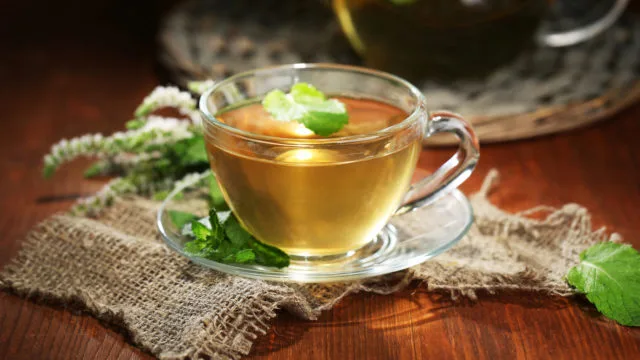wellhealthorganic.com: 5-herbal-teas-you-can-consume-to-get-relief-from-bloating-and-gas
If you’re experiencing bloating and gas, you may be able to relieve these symptoms with some simple herbal tea remedies. Some of the most effective herbal teas for reducing bloating and gas include chamomile, dandelion, ginger, lavender, and raspberry leaf tea. Remember to drink plenty of fluids while consuming any of these teas, as well as eat a nutritious breakfast or lunch to keep your body hydrated.
What are some herbal tea remedies for bloating and gas?
- Chamomile Tea: Known for its soothing properties, chamomile tea is an excellent remedy for bloating and gas. It helps to relax the muscles in the digestive tract, which can help to relieve symptoms of gas and bloating. Chamomile tea also has anti-inflammatory properties that can help to reduce inflammation in the gut.
- Peppermint Tea: Peppermint tea is another great option for those looking to reduce symptoms of bloating and gas. It has natural antispasmodic properties that can help to relax the muscles in the intestines, allowing trapped gas to be released more easily. Additionally, peppermint tea has a cooling effect on the body, which can provide relief from discomfort caused by bloating.
- Fennel Tea: Fennel seeds have been used for centuries as a digestive aid due to their carminative properties, which means they can help to prevent or relieve gas buildup in the stomach and intestines. Drinking fennel tea may also stimulate digestion and increase bile production, further aiding in digestion and reducing bloating.
Overall, incorporating these herbal teas into your daily routine may provide relief from uncomfortable symptoms of bloating and gas while also providing additional health benefits such as reduced inflammation and improved digestion.
Tea Options for Bloating and Gas Relief: Lemon, Chamomile, Fennel, Ginger, Valerian
wellhealthorganic.com: 5-herbal-teas-you-can-consume-to-get-relief-from-bloating-and-gas, Fennel tea is a popular option for bloating and gas relief as it contains compounds that have anti-spasmodic properties. These compounds help to relax the muscles in the digestive tract, reducing cramping and bloating. Additionally, fennel tea can help to stimulate digestion, which can aid in reducing gas production.
Ginger tea is another excellent choice for those experiencing bloating and gas discomfort. Ginger contains substances that have anti-inflammatory properties that can help to reduce inflammation in the gut. It also has carminative effects which means it helps expel gas from the intestinal tract.
Valerian root tea has been used for centuries as a natural remedy for digestive issues such as bloating and gas. This herb contains valeric acid which has antispasmodic effects on the muscles of the stomach and intestines. Drinking valerian root tea before bed may not only relieve uncomfortable symptoms but also promote better sleep quality due to its calming effect on the body.
What are the benefits of drinking herbal tea?
Herbal tea has been used as a natural remedy for centuries due to its numerous health benefits. One of the most significant advantages of drinking herbal tea is its ability to help with digestion. Certain herbs, such as ginger and peppermint, can soothe stomach discomforts like bloating and gas, making them an ideal choice for those suffering from indigestion.
Another benefit of herbal tea is its ability to boost the immune system. Some herbs contain antioxidants that help protect cells from damage caused by free radicals in the body. These antioxidants can also reduce inflammation and prevent chronic diseases like heart disease and cancer. Chamomile tea, for example, contains anti-inflammatory compounds that may help alleviate symptoms associated with conditions such as arthritis.
Finally, herbal teas are a great way to relax and unwind after a long day. Many herbs have calming properties that can promote relaxation and improve sleep quality. Lavender tea is known for its calming effects on both the mind and body, while valerian root tea may help reduce anxiety levels before bed. Drinking these teas before bedtime can lead to better sleep quality overall, allowing you to wake up feeling refreshed and rejuvenated in the morning.

1. Herbal Tea: Chamomile tea
Chamomile tea is the first herbal tea on our list and for good reason. Chamomile has been used for centuries as a natural remedy for various health issues. The plant contains flavonoids, which are compounds that have anti-inflammatory properties, making it an excellent choice for reducing bloating and gas. Drinking chamomile tea after meals can help soothe the digestive system and prevent discomfort.
Another great benefit of chamomile tea is its calming effect. This herbal tea contains apigenin, an antioxidant that can promote relaxation and reduce stress levels. By sipping on a cup of chamomile tea before bed or during moments of anxiety, you can calm your mind and body while also improving your digestive health.
Overall, chamomile is a versatile herb that offers numerous benefits beyond just relieving bloating and gas symptoms. Whether you’re looking to improve digestion or simply relax after a long day, incorporating chamomile tea into your daily routine may be just what you need to feel better both physically and mentally.
2. Herbal Tea: Turmeric tea
Turmeric tea is a popular herbal tea that has numerous health benefits. It is made from the root of the turmeric plant, which contains Curcumin – a potent antioxidant and anti-inflammatory compound. Drinking turmeric tea regularly can help improve digestion, reduce inflammation in the body, and boost immunity.
One of the main reasons why turmeric tea is excellent for relieving bloating and gas is that it aids in digestion. It stimulates the production of digestive enzymes that break down food more efficiently and prevents gas buildup in the stomach. Additionally, Turmeric has antibacterial properties that help kill harmful bacteria in your gut, preventing infections that could cause bloating.
Turmeric tea also helps to soothe inflamed tissues within your digestive tract by reducing inflammation caused by harmful bacteria or other irritants. This soothing effect reduces discomfort caused by bloating and gas while improving overall digestion. Consuming turmeric tea daily can be an effective way to get relief from bloating and gas naturally without relying on medications or chemical-based remedies.
3. Herbal Tea: Fennel tea
Fennel tea is a popular herbal tea that has been used for centuries to help with digestive issues such as bloating, gas, and stomach cramps. Fennel seeds contain an active compound called anethole, which has antispasmodic properties that can help to relax the muscles of the digestive tract. This can lead to a reduction in bloating and gas as well as relief from other symptoms such as constipation.
In addition to its digestive benefits, fennel tea is also thought to have anti-inflammatory properties that can help with conditions such as arthritis and asthma. It may also have antibacterial properties that can help to fight off infections in the body. Fennel tea is easy to make at home by steeping fennel seeds in boiling water for 5-10 minutes.
Overall, fennel tea is a great choice for anyone looking for natural relief from bloating and gas. However, it’s important to note that if your symptoms persist or worsen over time, it’s best to consult with a healthcare provider as they may be indicative of an underlying medical condition that requires treatment.
4. Herbal Tea: Peppermint tea
Peppermint tea is a refreshing and soothing herbal tea that has been used for centuries to treat various health issues. It is commonly consumed after meals to ease digestive discomforts such as bloating, gas, and indigestion. Peppermint tea contains menthol, which has antispasmodic properties that help relax the muscles in the digestive tract.
Peppermint tea also helps reduce inflammation in the gut lining, making it an effective remedy for those suffering from irritable bowel syndrome (IBS). It can also help alleviate symptoms of nausea and vomiting due to its calming effect on the stomach muscles. Additionally, peppermint tea has antibacterial properties that may help fight off harmful bacteria in the gut.
To make peppermint tea at home, simply steep a handful of dried peppermint leaves or a peppermint tea bag in hot water for several minutes. You can add honey or lemon juice for added flavor if desired. Overall, adding peppermint tea to your daily routine is an easy way to support healthy digestion and relieve discomfort caused by bloating and gas.
5. Herbal Tea: Ginger tea
Ginger tea is the fifth herbal tea that can help you get relief from bloating and gas. Ginger has been used for centuries as a natural remedy for various ailments, including digestive issues. Ginger contains compounds called gingerols and shgaols which are known to have anti-inflammatory properties that can reduce inflammation in the gut.
Drinking ginger tea after meals can help stimulate digestion and prevent bloating and gas. Ginger also helps relax the intestinal muscles and improve overall gastrointestinal function. The warming effect of ginger on the body promotes sweating, which helps eliminate toxins from the body, further aiding digestion.
Ginger tea is easy to make at home by steeping fresh or dried ginger slices in hot water for 5-10 minutes, depending on how strong you want your tea to be. You can also add lemon or honey to enhance its taste and benefits. Overall, incorporating ginger tea into your daily routine may be an effective way to alleviate digestive discomfort caused by bloating and gas.
What are herbal teas good for?
- Peppermint tea: One of the most popular herbal teas, peppermint tea is known for its refreshing taste and digestive benefits. It contains menthol, which helps to relax the muscles in your digestive tract and relieve bloating and gas. Additionally, peppermint tea has anti-inflammatory properties that can soothe an upset stomach and reduce nausea.
- Ginger tea: Ginger has been used as a natural remedy for digestive issues for centuries. As an herbal tea, ginger can help to stimulate digestion, reduce inflammation in the gut, and ease bloating and flatulence. It also contains compounds that have a calming effect on the stomach muscles, making it a great choice for relieving nausea or vomiting.
- Chamomile tea: Chamomile is another popular herbal tea with powerful anti-inflammatory properties that can help to soothe an irritated stomach lining. It also has relaxing effects on the body, which makes it particularly useful for easing anxiety-related gut problems like indigestion or irritable bowel syndrome (IBS). Chamomile has also been shown to improve sleep quality when consumed before bedtime.
Overall, there are many different types of herbal teas with various health benefits including improving digestion, reducing inflammation in the gut and promoting relaxation in the body. Incorporating these teas into your daily routine may be beneficial if you experience frequent bloating or gas discomforts or simply want to promote overall digestive health naturally without resorting to medication.
How do herbal teas work to relieve bloating and gas?
Peppermint, ginger, and fennel teas are popular herbal remedies for bloating and gas. Peppermint tea is made from the peppermint plant’s leaves, which contain menthol. Menthol helps to relax the muscles in your digestive tract, allowing gas to pass through more easily. A study showed that peppermint oil capsules might relieve symptoms of irritable bowel syndrome (IBS), including bloating and gas.
Ginger tea comes from ginger root, which contains compounds like gingerols and shogaols that help reduce inflammation in the gut. These compounds also stimulate digestion by increasing the production of digestive juices in your stomach. This increased activity can help move food through your intestines more easily, reducing the likelihood of gas buildup.
Fennel tea is made from fennel seeds that are high in antioxidants and anti-inflammatory properties. Fennel seeds contain anethole, a natural compound that can relax your gut muscles and allow trapped gas to pass out of your system quickly. Additionally, fennel tea may have a mild diuretic effect on some people due to its ability to increase urine output, which can help alleviate water retention associated with bloating.
Conclusion:
In conclusion, herbal teas are a great way to soothe your stomach and reduce bloating and gas. With so many different options available, it’s easy to find one that fits your preferences and needs. Whether you prefer the spicy taste of ginger tea or the calming effects of chamomile tea, there is an herbal tea out there for everyone.
It’s important to note that while herbal teas can provide relief from bloating and gas, they should not be used as a replacement for medical treatment if you have a serious digestive issue. If you experience persistent symptoms or severe discomfort, it’s best to consult with a healthcare professional.
Overall, incorporating herbal teas into your routine can have many benefits beyond just reducing bloating and gas. They can help promote relaxation, aid in digestion, boost your immune system, and much more. So why not give them a try? Your stomach (and taste buds) will thank you!
Read Also…. wellhealthorganic-com-vitamin-e-health-benefits-and-nutritional-sources









